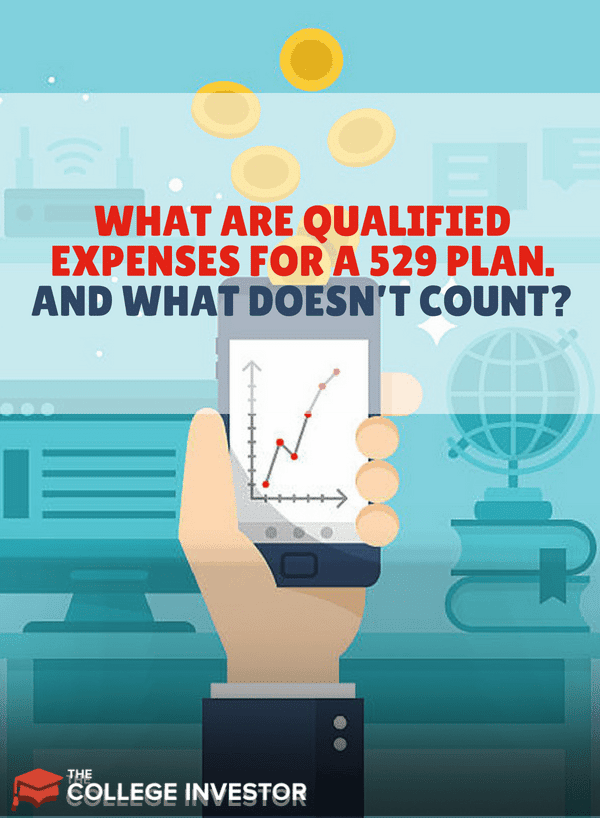
Opening a 529 plan to save for your child’s college expenses can be a great way to build savings while reaping tax benefits.
Some of the benefits of a 529 plan include tax free growth and tax free withdraws if the money is used for "qualified education expenses". But one thing that stops many would-be 529 owners is understanding what exactly a 529 plan will cover - what exactly are qualified education expenses?
If you’ve been considering opening a 529, here are some common qualified expenses you should be aware of. We also go into depth on some of the non-qualified expenses that people sometimes get mixed up and "think" they do qualify. Make sure you don't fall into that trap.
Qualified Expenses For A 529 Plan
A 529 plan only covers expenses that are related to education (see below for using a 529 plan for elementary education). However, there are rules. Most qualified expenses cannot exceed the cost estimates made by the school that the 529 beneficiary will be attending. Typically the school’s financial aid office will mail this to students or post it on their website. For example, you can find the estimated cost of attendance for UCLA here.
K-12 education includes any kindergarten through 12th grade school - public or private. Note: only tuition is qualified up to $10,000 per year. Also notice that pre-K and child care are NOT eligible.
Post-secondary education includes college, university, trade schools, vocational programs, and registered apprenticeship programs.
Finally, the state the account owner files taxes in is the state that the 529 plan rules apply. Since each state maintains different rules for qualified expenses, make sure you check with your account owner (typically the parent) state of residence.
Here’s what’s covered:
Tuition – Tuition is a qualified expense for both full and part time students at accredited institutions. To be accredited simply means the college or university has passed standards set by a reviewing committee. While the majority of colleges are accredited be sure to ask the financial aid office ahead of time.
Room and Board – If the student is attending college half-time or more and the room and board are paid directly to the college or university this is a qualified expense.
If room and board are to be paid to a landlord and grocery store, the budget is set by the school and is available to students who are attending half-time or greater. If the rent paid to a landlord is higher than the school’s room and board estimate the excess is not considered a qualified expense.
For example, using our UCLA estimated cost above, it’s estimated that it will cost $9,800 for room and board off campus. That means that you cannot use more than $9,800 per year from your 529 plan to be “qualified”.
Technology Items – You can use a 529 plan to cover technological needs such as computers, printers, laptops and even internet service. These items must be used by the plan beneficiary while enrolled in college. You can also use this to get software that’s required for school – for example, maybe you need to install Microsoft Word or Adobe Photoshop to get the right tools for class. Make sure you check out your campus bookstore and look for “Education” versions of software – it’s much cheaper!
Books and Supplies – Books and supplies are qualified expenses but only the ones that are required. Also, this budget will be set by the school, but if it’s a required expense of your class, you can always use your 529 money. Beyond textbooks, some common items include lab supplies, scantrons, and even basics like pen and paper.
Student Loan Repayment – Student loan repayment is now a qualified expense on the federal level, but it may not be eligible in your state. You can take out $10,000 per individual as a lifetime limit. See our section below on this new feature. Read our full guide to using a 529 plan for student loan repayment here.
K-12 Tuition - Tuition at a public or private K-12 school is a qualified expense on the federal level up to $10,000 per year, but it may not be eligible in your state. Click on your state on our 529 plan guide and see if your state qualifies.
IRA Rollover - You can potentially rollover up to $35,000 into a Roth IRA. However, this is a limited option with a lot of restrictions and some states won't comply. Read our full guide here: How To Rollover A 529 Plan To An IRA.
Expenses That You Think Might Qualify, But Don’t
There are also expenses that you might think qualify for 529 plan distributions, but you’d be surprised to learn that they don’t qualify.
Transportation and Travel – If your child is going away to school, you’re going to inevitable deal with transportation and travel expenses. You need to move them in, move them home, and you’re likely going to fly them home for holidays and vacations. Plus, if you're using a 529 plan for overseas school or study abroad, Visas and other travel are as not qualified. So you can’t use your tax free 529 plan money for these.
General Electronics and Cell Phone Plans – Cell phones are an everyday part of life. As such, they are not considered an education expense, and while “necessary”, they can’t be expensed and paid for with your qualified distributions from your 529 plan.
Sport and Fitness Club Memberships – Many colleges offer sports or fitness clubs for their students to use, and they typically charge a small monthly fee. And even though the college or university bills this expense, it’s not considered an education expense. Since it’s not an education expense, you can’t use your qualified 529 plan money to pay for it.
Insurance – Health insurance is so important for college students, and if you don’t stay on your parent’s plan, many people opt to use a plan provided by the college or university. Many schools offer health services and insurance on campus, which is helpful. However, once again, just because the expense is billed by the university, it’s not education related, and so you cannot use your 529 plan money for it without paying a penalty.
Using A 529 Plan For Private Elementary Or High School
Starting in 2018, you are now eligible to use 529 plan expenses for private elementary through high school tuition. Notice tuition - it's only eligible for tuition.
You can withdraw up to $10,000 per year to pay for private school tuition.
There are a lot of nuances around this (especially the states that don't allow it), so check out our full article on using a 529 plan to pay for private elementary school here.
Plus, you likely want to make sure you are using the right plan for your state:
Using A 529 Plan To Pay Student Loan Debt
You are now eligible to withdraw up to $10,000 tax-free for qualified education loan payments, as long as your state allows it.
It's important to note, if you pay a student loan with 529 plan money, student loan interest paid for with tax-free 529 plan earnings is not eligible for the student loan interest deduction.
There is also a $10,000 lifetime limit that applies to the 529 plan beneficiary and each of their siblings.
Basically, if you have two children, the max you can withdraw to pay for student loan debt is $20,000 - $10,000 per child.
See our full guide to using a 529 plan for student loans here.
What Happens If You Use A 529 For A Non-Qualified Expense?
Many parents worry that:
- Their child will not end up going to college
- They’ll need to use the 529 money for expenses other than the ones listed above
So what exactly happens when you use a 529 plan for a non-qualified expense?
If you remember from our previous 529 articles, one of the main benefits of investing in a 529 is the federal and sometimes, state, tax breaks. Owners of 529 plans are given these breaks when the money saved is specifically use for college expenses. In the event that you need to withdraw the money for a different reason, you’ll have to pay federal taxes on the account earnings and a 10% penalty. If you’ve received a state tax break, you may also have to pay that back as well. Make sure you check with your tax preparer because every state has different rules around this.
You should also be aware that if one of your children decides not to go to college, you could change the beneficiary on the account without penalty.
How Do You Withdraw Your 529 Plan Funds?
Depending on your state’s plan, there are typically several ways to withdraw your 529 plan money. For example, Scholarshare allows you to request a withdrawal online, by mailing in a form via snail mail, or by calling their call center.
You can have the funds sent to the participant, the beneficiary, the school directly, or a third-party. Many 529 plans, including Scholarshare, allow for ETF transfers as well, which can speed up the process dramatically.
When you take a withdraw, you are not required to provide any proof of whether the money is being used for qualified or non-qualified expenses. However, you are required to declare it to the IRS when you file your taxes, and so it’s important to maintain accurate records should you need them.
So, Is A 529 Worth it?
There are many benefits to participating in your state’s 529 plan. (See a big list of them here.) But it’s important that you know exactly what you can and can’t use your 529 plan for.
When it comes to time to actually use the money you’ve saved, be sure that you know the laws and are utilizing your 529 savings in the most efficient way possible. If you have specific questions, it never hurts to speak to an accountant that’s familiar with 529 plans.
If you're curious to how you stack up with college savings, check out our How Much Should You Have In A 529 Plan By Age.
Make your college savings work for you!

Robert Farrington is America’s Millennial Money Expert® and America’s Student Loan Debt Expert™, and the founder of The College Investor, a personal finance site dedicated to helping millennials escape student loan debt to start investing and building wealth for the future. You can learn more about him on the About Page or on his personal site RobertFarrington.com.
He regularly writes about investing, student loan debt, and general personal finance topics geared toward anyone wanting to earn more, get out of debt, and start building wealth for the future.
He has been quoted in major publications, including the New York Times, Wall Street Journal, Washington Post, ABC, NBC, Today, and more. He is also a regular contributor to Forbes.
Editor: Clint Proctor Reviewed by: Mark Kantrowitz
